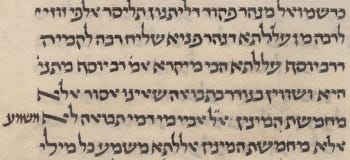Nedarim 55a relates that Bar Mar Shmuel gave a gift to Rava in a way that causes Rava to query Rav Yosef.
בַּר מָר שְׁמוּאֵל פַּקֵּיד דְּלִיתְּנוּן תְּלֵיסַר אַלְפֵי זוּזִי לְרָבָא מִן עֲלַלְתָּא דִּנְהַר פַּנְיָא. שַׁלְחַהּ רָבָא לְקַמֵּיהּ דְּרַב יוֹסֵף: ״עֲלַלְתָּא״ הֵיכִי מִיקַּרְיָא? אָמַר רַב יוֹסֵף, מַתְנִיתִין הִיא: וְשָׁוִין בַּנּוֹדֵר מִן הַתְּבוּאָה שֶׁאֵין אָסוּר אֶלָּא מֵחֲמֵשֶׁת הַמִּינִין. אֲמַר לֵיהּ אַבָּיֵי: מִי דָּמֵי? ״תְּבוּאָה״ — לָא מַשְׁמַע אֶלָּא מֵחֲמֵשֶׁת הַמִּינִין, ״עֲלַלְתָּא״ — כׇּל מִילֵּי מַשְׁמַע. § The Gemara relates:
The son of Master Shmuel commanded his workers that they give thirteen thousand dinars to Rava from the crop [alalta] produced in his fields on the banks of the Panya River. Rava sent this question before Rav Yosef: What is called alalta; what crops are included in the category of alalta? Rav Yosef said: It is as it is taught in the baraita cited above: And they agree with regard to one who vows that tevua is forbidden to him that it is prohibited for him to eat from only the five species of grain; just as tevua includes only the five species, so too alalta includes only the five species. Abaye said to him: Are the two cases comparable? Although tevua means grain and includes only the five species, alalta means crop and includes all items that grow.
While we know of Mar Shmuel, and it certainly is possible that he had a son, I’m unconvinced that he exists in this story. There are difficulties both in the scholastic generations as well as the underlying manuscripts.
Mar Shmuel Mar is a fifth-generation Amora, who interacts with Rava and then Rava’s student Rav Pappa. It seems strange for his sixth-generation son to interact with fourth-generation Rava, especially while third-generation Rav Yosef is still alive. And if Mar Shmuel Mar interacts with fifth-generation Rav Pappa, he should still be around, so why is it his son who is granting such a generous gift?
Consulting manuscripts, it’s plausible that bar should read kad, meaning “when”, as it appears in Munich 95, reading כדשמו' מר פקיד. Less likely is Vatican 110, which has כדשמואל מנהר פקוד, which besides כד also changes Mar pakid (name commanded) into a place, Nehar Pekod. Yes, we have Rav Yaakov of Nehar Pekod, but aside from not knowing any such Shmuel, we need פקד as the verb. Another strong possibility is that בר / כד should read מר, since that’s his full name, Mar Shmuel Mar.
Here are the variants from the Hachi Garsinan website:
and here is the Vatican 110-111 manuscript for Nedarim 55a, which hasכדשמואל מנהר פקוד.
On Language
Mar Shmuel Mar’s gift was ambiguous. Which crops were included in עֲלַלְתָּא? Rava sent to the question before Rav Yosef in Pumbedita, and both Rav Yosef and Abaye reacted. Rav Yosef noted a brayta about vowing against תְּבוּאָה, that it encompasses only the five grains, and applied the same to עֲלַלְתָּא. Abaye objects, for maybe this is only the implication of the Hebrew word תְּבוּאָה, but the Aramaic עֲלַלְתָּא would encompass anything that grows from the ground.
It seems the point of dispute is whether the parallel term in Semitic languages have the same implication and extent. I’d add that in Klein’s etymological dictionary, he notes how תבואה stems from בא, “to come”, in the taqtul form, thus “that which is brought in”, and that to understand the sense development, we should compare Aramaic and Syriac עֲלַלְתָּא, “product, provision, income”, which derives from עלל (“he entered”), and Arabic ghalla (yield, produce) deriving from ghalla (“he inserted; he entered”). I’ll omit the Akkadian example and the word יבול, but I’ll just add that the Targum for בֹּא אֶל-פַּרְעֹה is עוֹל לְוָת פַּרְעֹה. (Compare with Rosh’s commentary, and Shita Mekubetzet, for related but different ideas about the etymology and extent.)





